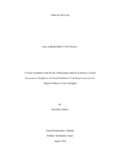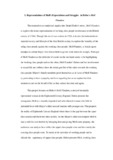Please use this identifier to cite or link to this item:
https://elibrary.tucl.edu.np/handle/123456789/3028| Title: | Irony in Daniel Defoe’s Moll Flanders |
| Authors: | Chhetri, Debi Ram |
| Keywords: | Literature;Novel |
| Issue Date: | 2014 |
| Publisher: | Central Departmental of English |
| Abstract: | This research looks into Defoe’s Moll Flanders from the perspective of irony. The essence of this research is that Moll happens to commit herself ironical situations and circumstances one after the other in her relentless hunt for prosperity, security and stability in her life. Several forces, both materialistic and non-materialistic, produce effects in her in such a way that she has no power to master those forces like greed, betrayal, deception and incestuous temptations. But she goes on to pretend that she is capable of achieving what she cherishes to achieve independent of those restrictive forces. Only after committing moral crimes or social crimes, she begins to think about the moral implications of her activities. It is entirely ironical of Moll to feel guilty of doing what she now thinks wrong activity. At the time of doing wrongs deeds, she does not think about how guilty she would have to feel for doing such forbidden activities. In a hope to marry a well-to-do man, she happens to land herself in an unhappy marriage with a pauper. Before her marriage with such a pauper, she gives him promises to handle any hardship of life tactfully. But in the wake of horrifying reality about the economic status of her husband, she rushes to abandon him callously. Moll’s extreme self-consciousness is itself a source of the ironic disparity between what she hopes to accomplish and what she really accomplishes. |
| URI: | http://elibrary.tucl.edu.np/handle/123456789/3028 |
| Appears in Collections: | English |
Files in This Item:
| File | Description | Size | Format | |
|---|---|---|---|---|
| cover.pdf | 326.56 kB | Adobe PDF |  View/Open | |
| chapter.pdf | 679.26 kB | Adobe PDF |  View/Open |
Items in DSpace are protected by copyright, with all rights reserved, unless otherwise indicated.
